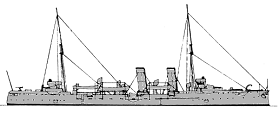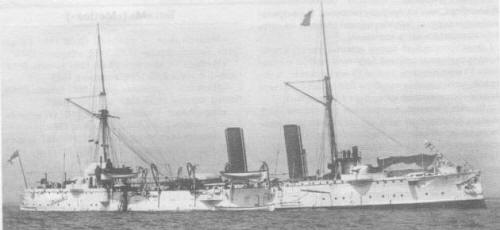

Magicienne 1889
| Name | No | Yard No | Builder | Laid down | Launched | Comp | Fate |
| Magicienne | 328 | Elder, Govan | 10.8.1887 | 12.5.1888 | 11.2.1889 | sold 7.1905 | |
| Medea | Chatham DYd | 25.4.1887 | 9.6.1888 | 5.1889 | sold 4.1914 | ||
| Medusa | Chatham DYd | 25.8.1887 | 11.8.1888 | 6.1889 | hulk 1910 | ||
| Marathon | 329 | Elder, Govan | 10.8.1887 | 23.8.1888 | 7.1889 | sold to BU 8.1905 | |
| Melpomene | Portsmouth DYd | 10.10.1887 | 20.9.1888 | 7.1889 | sold to BU 8.1905 |
|
Displacement normal, t |
Medea, Medusa: 2800 Magicienne, Marathon, Melpomene: 2950 |
|
Displacement full, t |
|
|
Length, m |
80.8 pp |
|
Breadth, m |
Medea, Medusa: 12.5 Magicienne, Marathon, Melpomene: 12.8 |
|
Draught, m |
5.03 |
|
No of shafts |
2 |
|
Machinery |
Medea, Medusa: 2 VC, 6 cylindrical boilers Magicienne, Marathon, Melpomene: 2 HC, direct action, 6 cylindrical boilers |
|
Power, h. p. |
forced draught: 9000 |
|
Max speed, kts |
Medea, Medusa: 20 Magicienne, Marathon, Melpomene: 19.7 |
|
Fuel, t |
coal 400 |
|
Endurance, nm(kts) |
8000(10) |
| Armour, mm | steel; deck: 51-25, gunshields: 114, CT: 76 |
|
Armament |
6 x 1 - 152/26 BL Mk IV/VI, 9 x 1 - 57/40 6pdr Hotchkiss Mk I, 1 x 1 - 47/40 3pdr Hotchkiss Mk I, 3 x 1 - 11.9/78, 2 - 356 TT (1 bow, 1 aft), 2 - 356 TC |
|
Complement |
218 |
Project history: Provided under the 1886/87 Programme, these ships were reduced editions of the Mersey class and were inferior to those ships in all respects. They were reclassified third class cruisers while building. White design. Three of the class, Melpomene, Magicienne and Marathon, were sheathed in wood and copper for tropical service which increased the beam by 0.3m, added 150t to the displacement and reduced the designed speed by 0.25kt. They also differed from the unsheathed pair in having horizontal engines. The wood insulated the copper from the steel to prevent rapid electrolitic deacy, whilst the copper sheathing prevented rapid fouling in tropical waters. Within the next few years improved anti-fouling paints would reduce the need for so cumbersome an expedient. Three 152mm guns, mounted on sponsons, were fitted on each side, one on the forecastle, one amidships on the upper deck and one on the poop. Eight of the 57mm QF guns were mourned on the upper deck, 4 amidships, 2 forward and 2 aft and the ninth on the centreline at the after end of the poop. They did not achieve their designed speeds on trials, averaging 19kts, and proved poor steamers in service particularly in a seaway. An open upper deck amidships with low bulwarks made them very wet and they proved to be bad sea boats. They were fitted with a turtle back forecastle and the forward 6in guns were provided with a low breakwater indicating that the designers expected them to be wet ships. They also suffered from cramped accommodation and insufficient space in the boiler rooms for efficient stoking, and it was generally concluded that all their troubles resulted from their small size.
Ship protection: The protective deck was 25mm on the flat and 51mm on the slope, the flat being 0.3m above the load line and the outer edge of the slope 1.5m below.
Modernizations: 1890s, all: - 6 x 1 - 152/26; + 6 x 1 - 152/26 QFC Mk I/IV / I/VI / II/IV / II/VI / III/IV / III/VI
Naval service: Medea was laid up awaiting disposal in 1906, but recommissioned in April 1909 and paid off in 1913. Medusa was laid up out of commission in 1906 but was commissioned again as harbour hulk in 1910, used as calibrating vessel in 1914-1918, sold in 1920 and resold in October 1921.
Many thanks to Wolfgang Stöhr for additional information on this page.

Marathon as built
© Ivan Gogin, 2014